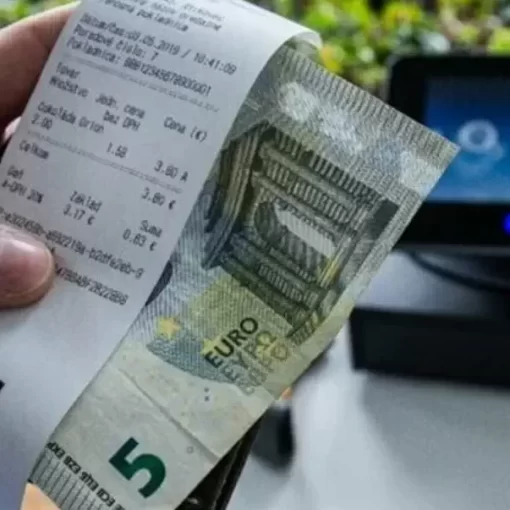Invoice received for the supply of goods from an EU supplier
Under Slovenian law, VAT is levied on the turnover of goods made within Slovenia. As the turnover of goods is taxed according to the place of destination, goods acquired in Slovenia are treated as taxable turnover.
There is a special feature in determining the place of acquisition of goods for acquisitions from another EU Member State, namely the place where the goods are placed at the disposal of the buyer of the goods at the end of the dispatch or transport.
For a supply of goods to be taxable in Slovenia as an intra-Union acquisition, the following conditions must be met:
- the seller is a taxable person identified for VAT in another Member State,
- the turnover is made for a consideration or is deemed to be made for a consideration,
- the goods are acquired in the territory of Slovenia, and
- the acquirer is a taxable person identified for VAT purposes in Slovenia.
A Slovenian taxable person identified for VAT must pay VAT on the acquisition of goods from another EU Member State in two cases; if the foreigner, on the supply of the goods (where the goods are deemed to be supplied where the buyer of the goods is identified for VAT), transfers the tax liability to a Slovenian taxable person with a VAT ID, and the latter calculates (pays) the VAT in accordance with the first paragraph of Article 76 of the VAT Act. If he/she fulfils all the conditions laid down by law for deduction, he/she may deduct the VAT charged in part or in full.
The same applies in the second case, where the foreigner does not himself charge VAT on the goods supplied in Slovenia and the Slovenian buyer of the goods with a VAT ID pays it instead. In this case, the buyer of the goods may deduct the VAT charged in part or in full if the conditions for deduction are met.
This self-assessment (the calculation and deduction of VAT on the receipt of the goods) takes place on the day of issue of the invoice or, if no invoice has been issued, no later than 15 March 2009. the day of the month following the month in which the chargeable event occurs.
In the above case, the recipient of the goods is identified for VAT in Slovenia. If the recipient of the goods is not yet VAT-registered in Slovenia (he is a small taxable person), the seller of the goods, who is VAT-registered, must charge VAT at the rate of the country in which he is VAT-registered. In this case, the VAT is paid in the other EU Member State, but this is a final cost for the recipient, who, as a small taxable person, cannot deduct it. If the recipient obtains goods from other EU Member States and the total amount in one year (or earlier) exceeds €10,000, he must register for VAT. In this case, he must apply to the FURS for a VAT ID number, known as a special VAT ID number, before the threshold is crossed. In this case, the company is obliged to account for and pay the VAT, but must not deduct it!
If a company receives goods from a small taxable person, whether the company is registered for VAT in Slovenia or is a small taxable person in Slovenia, it does not pay VAT or self-assess, as it is not obliged to account for VAT as a purchaser of goods from a small taxable person.
However, the above example does not apply to distance deliveries (sales by catalogue, internet, telephone, etc.) to the final consumer.
Invoice received for import of goods from a foreign supplier
An import is any entry of goods that do not have the status of EU goods under customs rules, or goods imported from a third country but not released for free circulation within the EU under customs rules in Slovenia, or any entry of other goods from a third territory into Slovenia.
The movement of goods between an EU country and a third country is treated as an import, which means that the importer must complete all import formalities with the competent customs authority.
VAT is payable on importation on the basis of a customs document (EUL), which the importer receives electronically from the customs authority. The VAT paid can be deducted by the company in its next tax return if it is entitled to deduct it or if the goods are imported for the purpose of carrying out a taxable activity. The right to deduct VAT arises on the date of receipt of the customs document on which the company is named as the consignee of the goods and on which the amount is shown to enable that amount to be calculated.
Invoice received for services rendered from a foreign supplier (EU and others)
In the same way as goods, services are also subject to taxation in Slovenia, where the place of taxation is Slovenia according to the VAT Act (ZDDV-1). For more information on the rules for determining the place of taxation of services, see VAT: rules for determining the place of taxation.
If a company receives a service for which the place of taxation is Slovenia and is designated as a VAT payer in accordance with Article 76 of the VAT Act, it must charge VAT on the service, or self-assess. If the company is entitled to deduct the full VAT, there is a zero effect. There is no reporting in the recapitulative statement for services received from abroad.
However, if the services are received and the place of taxation is outside Slovenia, the taxable person who supplies the services will account for the VAT, which the recipient can later claim from the local tax administration.
However, VAT can only be levied by a VAT-registered taxable person. If a company is a small taxable person (without a VAT ID) and receives services taxed under the general rule, and if these services are provided by a taxable person who is not established in Slovenia, the company is a VAT taxable person in this case and must therefore identify itself for VAT purposes.
However, before the service is received, you must apply to the FURS for a VAT ID number, known as a special VAT ID number. In this case, the company is obliged to account for and pay the VAT, but it must not deduct it! The special VAT ID number is then only used for such receipts for which the company is a VAT payer in Slovenia. However, for other supplies of goods or services that the company would subsequently make within Slovenia, it may continue to neither charge nor deduct input VAT with a so-called special VAT ID number.
A small taxable person who is not identified for VAT purposes, but who only supplies exempt services, does not need to be identified for VAT purposes when he receives services which are exempt from VAT under the provisions of the VAT Act.
The above rules are just the basics that an entrepreneur should be aware of and are not necessarily applicable in all cases. We advise you to carefully identify the facts and circumstances that lead you to the correct tax treatment.
This article has been prepared on the basis of the legislation and case law in force at the time of writing. In the event of subsequent changes in legislation or case-law, the author is not responsible for keeping the text up to date or in line with subsequent changes.


